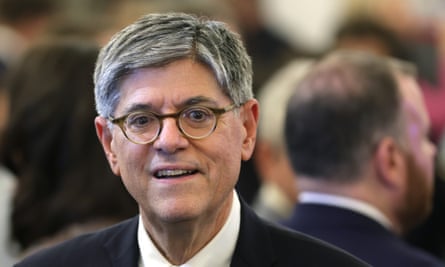Political turmoil in Washington has left the US without key diplomats across the Middle East and raised concerns that years of congressional dysfunction are taking their toll on US leadership.
A devastating weekend attack on Israel by Hamas gunmen shook the region and came at a moment when there is no US ambassador in place in Israel, Egypt, Kuwait, Lebanon or Oman.
In addition, the US Agency for International Development (USAid), which leads the government effort to help countries recovering from disaster, has been lacking an assistant administrator for the Middle East for nearly three years. The role is critical for dispatching emergency economic and humanitarian aid to the region.
The state department’s coordinator for counterterrorism, who spearheads efforts to defeat terrorism overseas, has also been awaiting confirmation for the better part of two years.
Such devastating vacancies in US government have been thrown into stark relief by what one senator called “an all-hands-on-deck moment in history” but come against the backdrop of worsening obstruction, budget showdowns and Republican infighting on Capitol Hill.
“Vladimir Putin couldn’t be happier,” said Dennis Jett, a former US ambassador to Mozambique and Peru and author of the book American Ambassadors. “His argument is democracy is dysfunctional and you need a dictator like him. It reinforces him and makes the Chinese happy and makes our allies wonder about our reliability. It all makes our foreign policy look confused and chaotic and is a threat to our national security.”
The United States has been without an ambassador in Israel since the July departure of Tom Nides, who returned to the US to join the bank Wells Fargo as vice-chair. Joe Biden nominated Jack Lew to succeed him. The Senate foreign relations committee has announced that it will hold Lew’s confirmation hearing next Monday, although he could face a grilling from Republicans over his time as Barack Obama’s treasury secretary when he served as point person defending the Iran nuclear deal.
Brett Bruen, the president of the public affairs agency Global Situation Room and the former global engagement director of the Barack Obama White House, said: “The departure of our last ambassador has left a major gap in our diplomatic coverage in Israel and raises a whole lot of questions.
“We want Jack Lew to be confirmed as quickly as possible but, even if he gets out there tomorrow, he is still at a major disadvantage vis-à-vis the likes of the Russian ambassador, the Chinese ambassador and leaders in the region who already have established the knowledge, the networks and the ability to navigate this … An ambassador freshly off a plane is not going to be able to master the details and to have the ability to pick up the phone to his or her counterpart in the Israeli government and say this has got to be prioritised or this has got to be done.”

The US is currently represented in Israel by the chargé d’affaires Stephanie Hallett, who on Wednesday tweeted a video of herself at the Gaza periphery, her voice breaking with emotion as she described the “unbelievable” atrocities committed there. “We stand with Israel,” she said.
Biden and senior US officials have been in frequent contact with Israeli prime minister Benjamin Netanyahu and their Israeli counterparts, and the secretary of state, Antony Blinken, was traveling to Israel on Wednesday. The lack of an ambassador is “not signaling an absence of communication”, said Larry Haas, a senior fellow at the American Foreign Policy Council, but, he said: “[P]articularly at a dicey moment like this, it is not cost-free by any stretch of the imagination”.
Haas, a former senior White House official, continued: “In a larger sense, it’s also remarkably inappropriate and frankly embarrassing to the world’s greatest power when that power is in increasingly bitter competition with China, Russia and other authoritarian states for the loyalty of people all around the world. This is ammunition for Xi Jinping and Vladimir Putin and the supreme leader of Iran and other dictators to once again promote their form of governance over the messiness and dysfunction of American government.
“Those who hold up ambassadorships, senior positions at the state department, senior positions at the Pentagon and so on are putting their interests above America’s interests and they’re hurting America on the world stage.”
US diplomacy has been underpowered for a while. In early November 2021, for example, Biden had made 78 ambassadorial nominations but just seven – or 9% – had been confirmed by the Senate.
The violence in Israel and Gaza caught Washington in a state of disarray even by recent standards. Republicans are looking for a successor to ousted speaker Kevin McCarthy in the House of Representatives and heading towards a budget showdown with Democrats that could lead to a government shutdown in about 40 days.
Meanwhile, Tommy Tuberville, a Republican senator from Alabama and champion of former president Donald Trump, has said he will continue to block more than 300 military promotions in protest against the Pentagon’s abortion-access policy. The Politico website reported that Pentagon officials who briefed senators this week on the Israel crisis emphasised nine senior military positions in the command responsible for the Middle East who are facing disruptions due to Tuberville’s holds.
Some observers insist that the US can remain effective in moments of global crisis. Biden ordered a surge of ammunition and interceptors for Israel’s Iron Dome – the country’s air defense system – and has promised Netanyahu that US planes will be landing in Israel with further capabilities in the coming days.
Philip Crowley, a former assistant secretary of state, said: “The secretary of state is on his way to the region. You’ve got your assistant secretaries, deputy assistant secretaries who are focused on this and working overtime. So we have the ability to do what we need to do. Were this to get held up for some reason, then that certainly would signal dysfunction but I don’t think we’re there yet.”
Source: The Guardian









